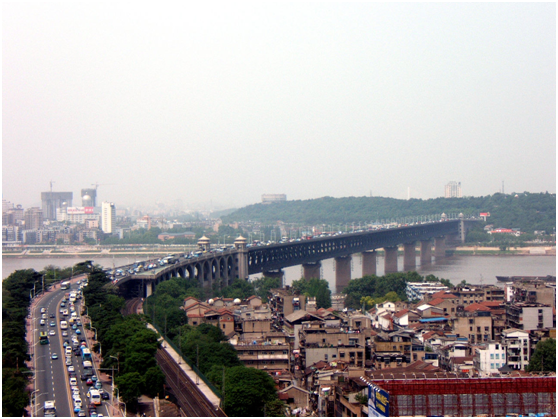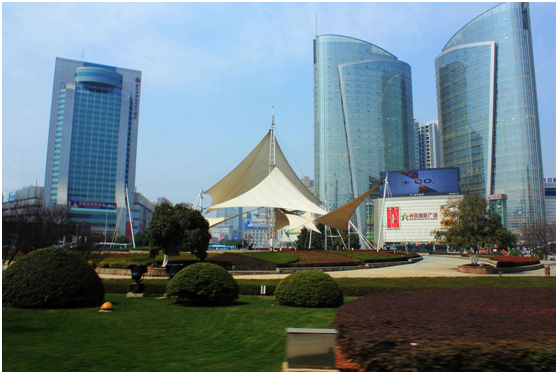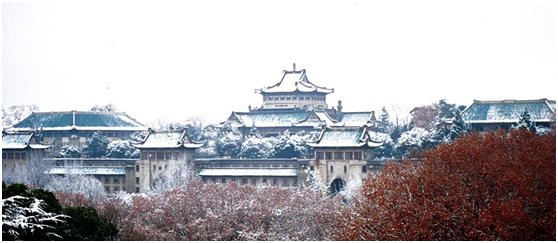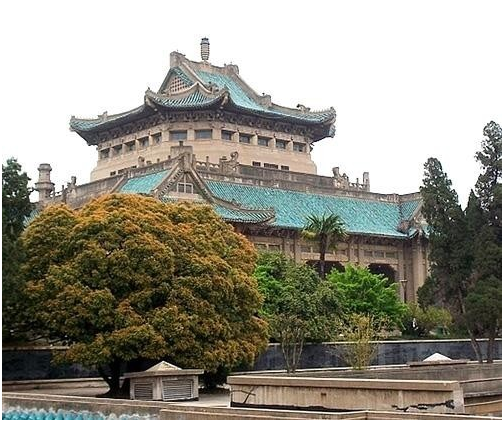Hubei University(Hubei)
Wuhan city, Hubei Province


Wuhan is the largest city in Hubei and the most populous city in Central China, with a population of over 11 million, the ninth most populous Chinese city, and one of the nine National Central Cities of China.
The name "Wuhan" came from the city's historical origin from the conglomeration of Wuchang, Hankou and Hanyang, which are collectively known as the "Three Towns of Wuhan". It lies in the eastern Jianghan Plain, on the confluence of the Yangtze River and its largest tributary, the Han River, and is known as "Nine Provinces' Thoroughfare".
Historical events taking place in Wuhan include the Wuchang Uprising, which led to the downfall of the Qing dynasty and the establishment of the Republic of China. Wuhan was briefly the capital of China in 1927 under the left wing of the Kuomintang (KMT) government led by Wang Jingwei. The city later served as the wartime capital of China in 1937 for ten months during the Second Sino-Japanese War.
Wuhan today is considered the political, economic, financial, commercial, cultural and educational center of Central China. It is a major transportation hub, with dozens of railways, roads and expressways passing through the city and connecting to other major cities. Because of its key role in domestic transportation, Wuhan is sometimes referred to as "the Chicago of China" by foreign sources. The "Golden Waterway" of the Yangtze River and its largest tributary, the Han River, traverse the urban area and divides Wuhan into the three districts of Wuchang, Hankou and Hanyang. The Wuhan Yangtze River Bridge crosses the Yangtze in the city. The Three Gorges Dam, the world's largest power station in terms of installed capacity, is located nearby. Historically, Wuhan has suffered risks of flooding, prompting the government to alleviate the situation by introducing ecologically friendly absorption mechanisms.
Brief introduction of the University
Hubei University is located in Wuhan, the capital of Central China’s Hubei Province. Its nearly eight-decade development turns Hubei University into a key comprehensive university covering arts, history, philosophy, science, engineering, economics, law, management, education, and medicine.


Hubei University offers at its main campus 56 undergraduate (bachelor degree) programs, 111 postgraduate (master degree) programs, 9 doctoral programs and 2 post-doctoral research programs in sixteen faculties: Creative Art, Arts, History & Culture, Resource & Environment, Business, Politics & Law & Public Administration, Mathematics & Computer Science, Life Science, Physics & Electronic Engineering, Chemistry & Chemical Engineering, Material Science & Engineering, Physical Education, Education, Foreign Studies, Philosophy, and Chu-cai (Hubei Talents). The main campus also includes International School, Continuing Education College, College of Training as well as Zhixing College, Vocational School of Technology and Academy of Military Training in other parts of the city. The student enrollment on main campus amounts to 18,000, including 2,100 postgraduates.
Hubei University enjoys a beautifully designed campus most suitable for teaching and learning. Also available to the staff and students are 122 laboratories, 95 multimedia classrooms, 17,000 sets of equipments and instruments, 2.2 million volumes of books and journals in the library, and a computer network system directly linked with Chinese Education and Scientific Research Net, offering international information resources for teaching and research. The only one IELTS Testing Center in Central China is based on this campus.
Hubei University wins the award entitled Top University in China for excellence in teaching, research and physical education, and remains for many years as holder of the honour Best Provincial Institution. Since 1949, the university has contributed tremendously to the society with an output of more than 150,000 students with different majors, maintaining high employment rate with its graduates most attractive to the employers.
English Teachers Number required: 2 Posts
Contract Period: 1st Sep, 2026 - 31st Jul, 2027
1st Mar, 2027 - 31st Jan, 2028
Requirements: BA and TESOL /TEFL. Some teaching experience preferred
Monthly Salary: 8,000 RMB
Teaching hours: 16 hrs per week
Age of students: University
Travel allowance: 2,200 RMB per school year, 1,100 RMB per school term
Accommodation: Accommodation: A free private furnished apartment on the school campus. It includes one private bedroom, full set of furniture. Washroom. Color TV with cable, living room, dinning room, balcony.
Internet access (Free): internet access (broadband) in the apartment
Medical Insurance: Medical care for foreign teachers in accordance with China's medical system. The school will provide teachers with a basic medical insurance and accident insurance .
Paid Holiday: Two days off per week, Public holidays in China
Work permit : The school will provide work permit for China at no cost to the teacher.
Air-ticket Reimbursement: round way airfare for the 11 month contract reimbursement will be made on completion of the contract
Closet Airport: Wuhan Tianhe International Airport